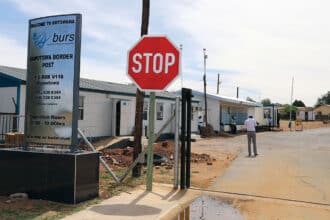Brave wife rescues hubby from crocodile jaws
A 62-year-old man of Setatunga settlement in North West District owes his life to his brave wife, Boikaego Masasa.
The old man, Kelebogile Thapelo was recently attacked by a crocodile while fetching water from the village’s river and has lived to tell the horrifying tale of his near death experience and challenges of co-existing with wildlife including giant elephants which graze daily on his front yard.
He was rescued by his loving wife, 61-year-old Masasa who pulled him from the reptile’s jaws in December last year although he only told the story of his survival this week in an exclusive interview at his farm house in Setatunga.
Shaking with evident terror in his voice as he narrates the ordeal from the comfort of his home, the old man said the unfortunate incident has since caused him so much emotional trauma.
“I grew up in this region, and played in the river, I have heard stories of people being eaten by crocodiles and never had I imagined that someday I would suffer the same fate,” said Thapelo who went on to narrate how story of how the attack happened.
“I went to the river along with my wife to help her carry water from the river. The river is not a very long distance from here so I carried one gallon of water (20 litre bottle) while she carried another.”
When they reached the river being a gentleman, Thapelo noted, he went in first to fill the bottle for his wife unaware that a creature as big as a log dug out canoe was lying in wait under the cover of the water.
“My wife sat on the grass under the tree as the sun was beating down. I took her bottle first and dipped it in the water and suddenly a crocodile swiftly grabbed my arm with its teeth and pulled me into the river. As I sunk under the water it dawned on me that I was going to be food for the big crocodile,” he said.
Luckily, Thapelo’s brave wife who was watching from the shade of the tree realized what was going on and sprang into action, jumping into the water as she screamed for help, “She pulled me with my other free hand and at this point I was helpless, the animal was strong but she did not give up.”

Recalling the incident, the fearless wife said, “I did not think of anything else but to rescue my husband. The animal was pulling him deeper into the water, so I jumped in and grabbed the other arm, when it pulled him the other way I pulled him harder in the opposite direction with all might and somehow I bent down towards the water as I pulled and I think the creature thought I was launching an attack and it therefore let go and retreated into the water.”
Masasa added that the frustrated animal kept making deep grumbling sounds from under the water. “It was obviously frustrated that it could not complete its task, it had obviously tasted his blood because he was bleeding profusely, the skin was torn and I had to use my doek [headscarf) to tie back the loose flesh.”
According to Masasa, the crocodile laid in good cover and one could have easily mistaken it for a sunken wooden canoe. “It was very big, in fact a bit longer than the average canoe,”explained Masasa.
The couple managed to call for assistance and they were rushed to hospital in Maun which is a little less than 10 kilometres away.
Meanwhile the couple has to deal with another animal related threat to their lives from elephants that recently created a path right next to their yard on their way to the river.
“People have to understand the meaning of co-existence of wildlife with people, we are a typical example. From around 3Pm we cannot go out of the yard, this open space in front of the yard becomes dark with elephants that in large numbers,” added Masasa.
The woman and her husband say in the past years only one or two elephants used that route but since the beginning of this year, large numbers of elephants have created a path across their village and they have made the river even harder to access.
“We are fighting for the little remaining water in the river with these animals. The only alternative we have is to pay neighbours who have vehicles or donkey carts to carry water for us, that is the only way we survive,” further explained Masasa.
In the meantime the couple has appealed for assistance from anyone who has the means to help them make their lives more secure, “We need better lighting, our solar panel is worn out and we have to burn more firewood at night to keep elephants at bay.”
Human-Wildlife conflict has been a global concern in regard to conservation and researches show that elephants, crocodiles, hippos, lions and buffaloes among other animals are problem animals in this region with herbivores often destroying crops and predators killing livestock and sometimes people.
Okavango Human Wildlife Conflict Foundation’s director, Kenosi Kamina has noted with concern growing numbers of people who are maimed by animal attacks. In an interview this week Kamina said his NGO is to embark on an awareness campaign to guide people on better ways to live alongside wildlife, “It is important for communities living in wildlife areas to understand animal behaviour. In as much as these animals are important in the ecosystem and tourism avenues, human life matters as well.”
Kamina explained that his NGO’s duty is to assist people who have been permanently injured by animals so they can adjust comfortably into their new lifestyle, “For instance in the case of Thapelo whose arm was disabled by the crocodile attack, we have to find goats or chickens for him to rear as he can no longer plough or paint houses as he used to in the past. Looking after livestock or chicken is something he wants to do now so he can continue earning income for himself and his family.”
Botswana has an estimated 130,000 elephant population which is believed to have increased to unsustainable levels following 2014 hunting ban. The ban was lifted in 2019 and most Community Development Trusts in Wildlife arrears were given hunting quotas. According to Sci First For Hunters Forum which was held in Kasane in 2021, at least 75 percent of community development trusts income in Botswana is believed to come from hunting; USD 3 million annually.
While some conservationists are against hunting, communities in these areas believe hunting is one way of controlling wildlife population and preserving the ecosystem and Professor of Tourism Studies at the Okavango Research Institute, (ORI) in Maun, Joseph Mbaiwa is in agreement that from time immemorial, human-wildlife conflict was there and all what is needed in proper management of this co-existence.
Hunting is said to be providing for over 53,000 jobs in many countries in the SADC region including Zimbabwe where 90 percent of CAMPFIRE program is funded by hunting of which 25 percent is said to benefit all households in that country. Further according to the forum, communities in Mozambique have seen improvements in clean water reticulation, road construction, emergency transport and construction of school through hunting benefits.
“In Zambia approximately 130,000 kilograms of fresh game meat worth USD 600,000 has been provisioned annually by hunting industry to rural communities,” it was explained in the forum’s report.







